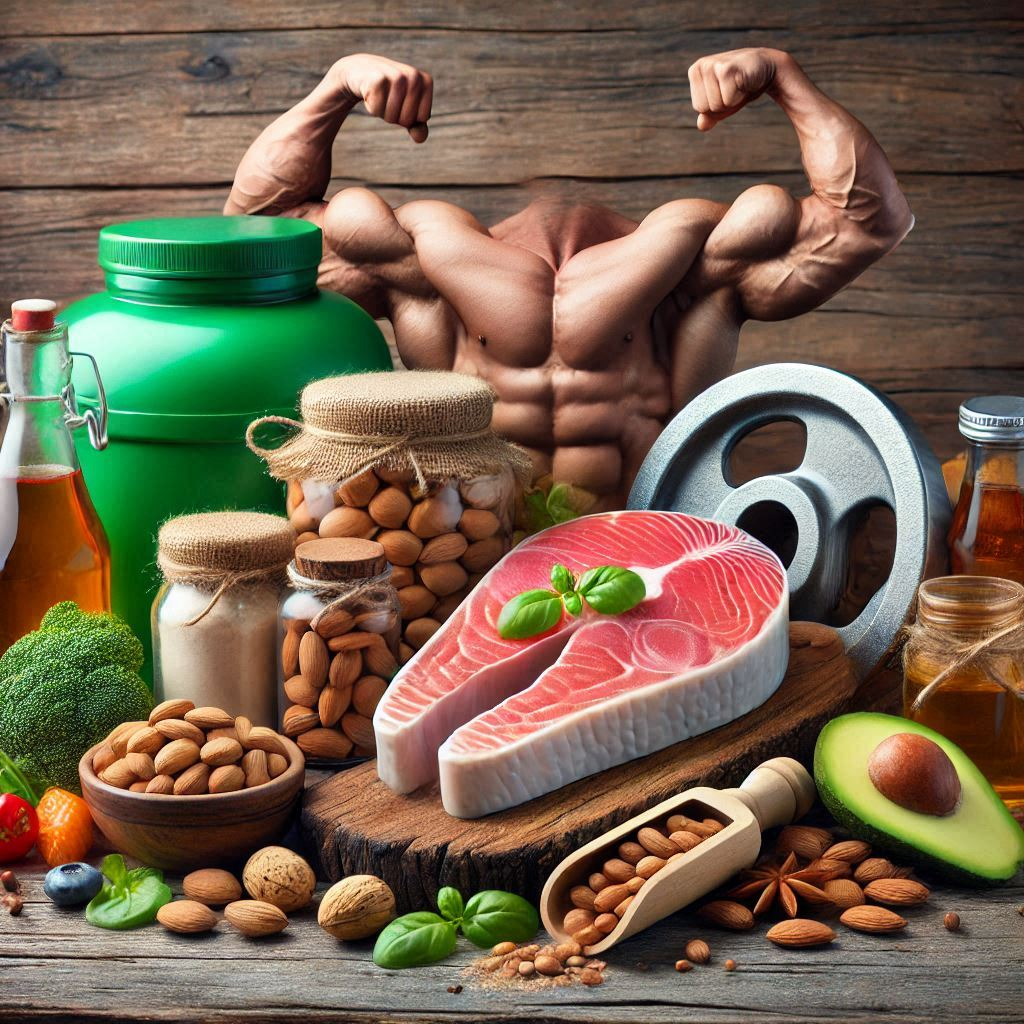
Milk or Egg: 8 Powerful Benefits to Know Today
Milk vs. Egg: 8 Essential Benefits You Should Know
Milk or Egg: Discover 8 essential benefits you should be aware of today. Learn about the powerful advantages of milk and eggs in this informative article.
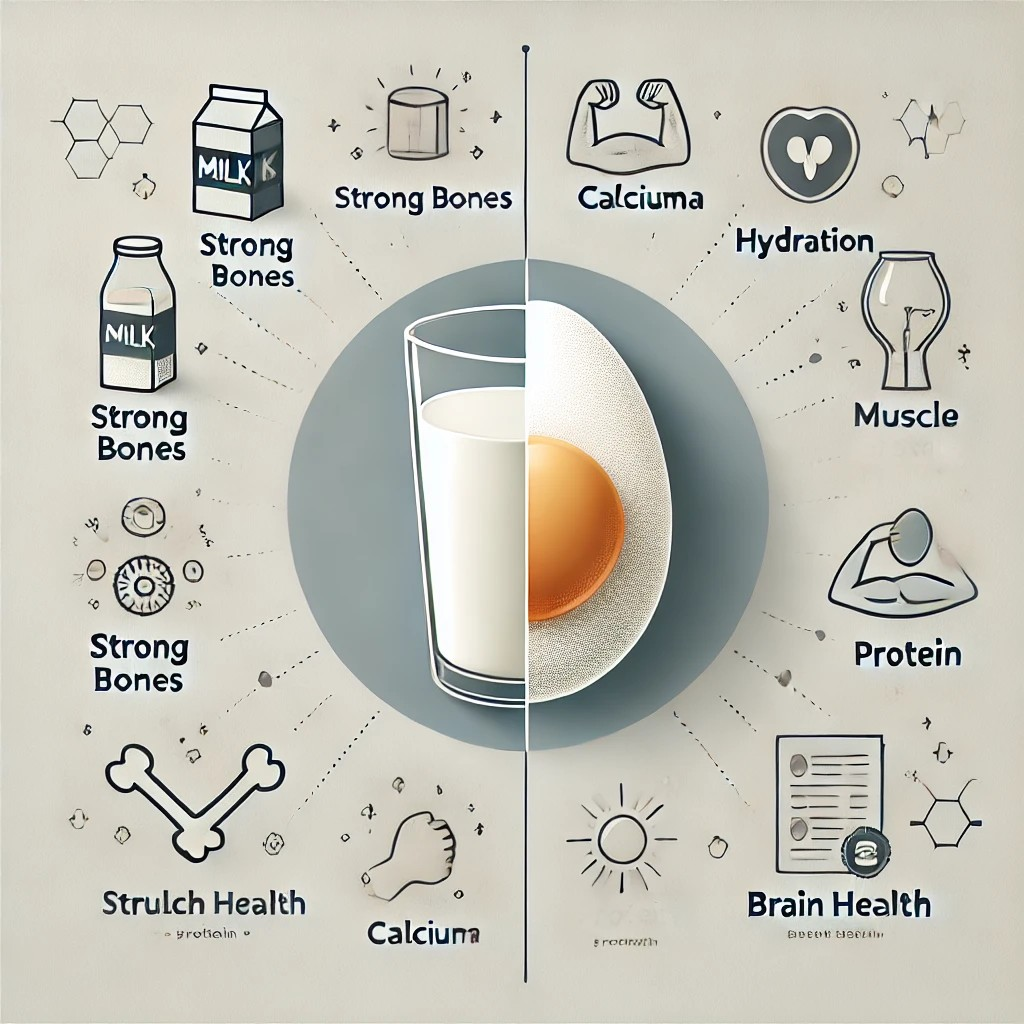
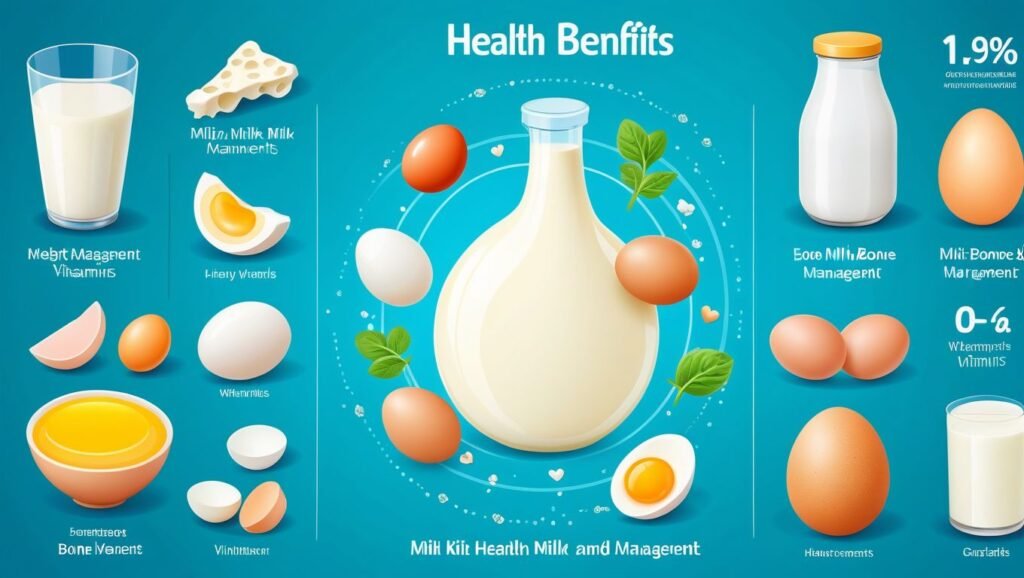
Milk or Egg: 8 Powerful Benefits to Know Today
Introduction
Milk and eggs are two of the most commonly consumed foods worldwide, each offering unique nutritional benefits. Understanding the advantages of both can help you make informed dietary choices. This article explores the powerful benefits of milk and eggs, comparing their nutritional value, protein quality, and impact on health.
Nutritional Value Comparison: Milk vs. Eggs
Milk and eggs are both nutrient-rich staples in many diets worldwide. They offer essential vitamins, minerals, and macronutrients that contribute to overall health. However, their nutritional profiles differ, and each brings unique benefits to the table.
Vitamins and Minerals in Milk
Milk is often referred to as a “complete food” due to its impressive nutritional content. Here’s an in-depth look at its key vitamins and minerals:
1. Calcium
- Role: Essential for strong bones and teeth, calcium also supports muscle function and nerve signaling.
- Content: A single cup (240 ml) of milk contains about 300 mg of calcium, covering 25-30% of the daily recommended intake.
2. Vitamin D
- Role: Works with calcium to maintain bone health and supports immune function.
- Content: Fortified milk is an excellent source, providing about 2.5 mcg (10% of the daily value) per cup.
3. Potassium
- Role: Regulates fluid balance, supports heart health, and aids muscle contractions.
- Content: Milk contains approximately 366 mg of potassium per cup.
4. Vitamin B12
- Role: Essential for red blood cell formation, DNA synthesis, and nerve health.
- Content: Milk offers about 1.2 mcg per cup, meeting nearly half of the daily requirement.
5. Riboflavin (Vitamin B2)
- Role: Helps convert food into energy and supports skin and eye health.
- Content: A cup of milk contains about 0.4 mg, covering 25% of the daily need.
6. Phosphorus
- Role: Works with calcium to build strong bones and teeth and supports energy metabolism.
- Content: Each cup delivers about 226 mg of phosphorus.
Vitamins and Minerals in Eggs
Eggs are another powerhouse of nutrition, offering a broad spectrum of essential nutrients in a compact form. Let’s break down their key vitamins and minerals:
1. Protein
- Role: Vital for muscle repair, growth, and overall cellular function.
- Content: A single large egg contains about 6 grams of high-quality protein.
2. Vitamin A
- Role: Supports vision, immune health, and skin regeneration.
- Content: Eggs provide 270 IU (5% of the daily value) per large egg.
3. Vitamin D
- Role: Enhances calcium absorption and contributes to bone health.
- Content: Eggs are one of the few natural sources, offering 1.1 mcg per egg.
4. Vitamin B12
- Role: Crucial for red blood cell production and neurological function.
- Content: A single egg contains 0.6 mcg, meeting 25% of the daily requirement.
5. Choline
- Role: Supports brain development, liver function, and nerve health.
- Content: Eggs are one of the best sources, with 147 mg per egg.
6. Selenium
- Role: Functions as an antioxidant and supports thyroid health.
- Content: A single egg offers 15.4 mcg, covering 28% of the daily value.
7. Iron
- Role: Essential for oxygen transport in the blood and energy production.
- Content: Eggs provide a small but bioavailable amount of iron (0.9 mg per egg).
Key Differences in Nutritional Value
| Nutrient | Milk (1 cup) | Egg (1 large) |
|---|---|---|
| Protein | 8 grams | 6 grams |
| Calcium | 300 mg | 28 mg |
| Vitamin D | 2.5 mcg | 1.1 mcg |
| Vitamin B12 | 1.2 mcg | 0.6 mcg |
| Choline | Negligible | 147 mg |
| Selenium | 9 mcg | 15.4 mcg |
Conclusion
Both milk and eggs are nutrient-dense, yet their unique profiles make them valuable for different dietary needs. Milk is unparalleled in its calcium and vitamin D content, making it crucial for bone health. Eggs, on the other hand, are an exceptional source of choline and selenium, supporting brain function and antioxidant protection. Including both in a balanced diet ensures a wide array of essential nutrients for optimal health.
Benefit 2: Protein Quality and Quantity
Protein is essential for the body as it aids in the growth, repair, and maintenance of tissues. Milk and eggs are both excellent sources of high-quality protein, but their benefits vary based on composition and absorption.
Complete Proteins Explained
A “complete protein” contains all nine essential amino acids that the body cannot produce on its own. Both milk and eggs are considered complete proteins.
- Milk:
Milk contains casein (80%) and whey (20%), both of which provide all essential amino acids. Whey protein, in particular, is fast-digesting and supports muscle recovery postexercise. - Eggs:
Eggs are regarded as the “gold standard” of protein due to their amino acid profile and high biological value (BV). The BV of eggs is 100, meaning the body can use all the protein efficiently.
Protein Absorption Rates
The rate at which the body digests and absorbs protein can affect how effectively it supports muscle growth and repair.
- Milk:
- Whey protein in milk is absorbed quickly, making it ideal for post-workout recovery.
- Casein is slow digesting, providing a sustained release of amino acids over several hours. This makes it an excellent choice for nighttime recovery.
- The combination of fast- and slow-digesting proteins makes milk versatile for various dietary needs.
- Eggs:
- Egg protein is digested at a moderate rate, providing a steady supply of amino acids.
- The bioavailability of eggs is unparalleled, ensuring the body absorbs nearly all the protein it provides.
Benefit 3: Bone Health
Bone health is crucial for overall well-being, and nutrients like calcium and vitamin D play pivotal roles. Milk and eggs contribute uniquely to maintaining strong and healthy bones.
Calcium in Milk
Calcium is the primary mineral responsible for bone strength and density, and milk is one of the richest dietary sources.
- Key Benefits of Calcium in Milk:
- Bone Density: Regular consumption of milk helps prevent osteoporosis and ensure bone density is maintained.
- Teeth Health: Calcium in milk supports the strength and health of teeth, reducing the risk of cavities and enamel damage.
- Daily Requirement: A single cup of milk provides 300 mg of calcium, meeting 25-30% of the daily recommended intake for adults.
- Additional Support:
Milk also contains phosphorus, which works in tandem with calcium to enhance bone strength.
Vitamin D in Eggs
Vitamin D is essential for calcium absorption and utilization, and eggs are a natural source of this critical nutrient.
- Key Benefits of Vitamin D in Eggs
- Calcium Absorption: Vitamin D enhances the body’s ability to absorb calcium from the diet, ensuring it reaches the bones.
- Bone Formation: It plays a vital role in forming and maintaining bone tissue, reducing the risk of fractures.
- Prevention of Rickets and Osteomalacia: Vitamin D from eggs helps prevent these conditions by promoting healthy bone development.
- Content in Eggs: A single large egg provides approximately 1.1 mcg of vitamin D, making it a valuable addition to the diet, especially in regions with limited sunlight exposure.
- Pairing Eggs with Milk:
Consuming eggs alongside milk can maximize the bone-health benefits by ensuring adequate calcium intake with the vitamin D needed for its absorption.
Conclusion
Milk and eggs are powerhouse foods that significantly contribute to bone health and protein needs. Milk excels in providing calcium and a combination of fast- and slow-digesting proteins, while eggs offer unparalleled protein quality and vitamin D, enhancing calcium absorption. Incorporating both into a balanced diet supports strong bones, muscle repair, and overall health.
Benefit 4: Heart Health
Heart health is influenced by dietary choices, particularly cholesterol and fat intake. While eggs and milk contribute differently to cardiovascular well-being, understanding their components can help optimize heart health.
Cholesterol Levels in Eggs
Eggs have been historically debated regarding their cholesterol content and their impact on heart health.
- Cholesterol Content:
- One large egg contains about 186 mg of cholesterol, primarily in the yolk.
- This was previously thought to significantly raise blood cholesterol levels. However, research shows that dietary cholesterol has a minimal effect on most people’s blood cholesterol compared to saturated and trans fats.
- Impact on Heart Health:
- For healthy individuals, moderate egg consumption (1 egg per day) does not increase the risk of cardiovascular disease (CVD).
- Eggs are also rich in unsaturated fats, which can promote heart health by improving cholesterol profiles.
- Nutrients Supporting Heart Health:
- Choline: Found abundantly in eggs, choline helps regulate homocysteine levels, reducing the risk of heart disease.
- Omega-3 Fatty Acids: Eggs enriched with omega-3s can improve heart health by reducing triglycerides.
Fat Content in Milk
Milk contains a mix of fats that can have both positive and negative effects on heart health depending on the type and amount consumed.
- Types of Fats in Milk:
- Saturated Fats: Full-fat milk contains about 4.6 g of saturated fat per cup, which may raise LDL (“bad”) cholesterol levels if consumed in excess.
- Unsaturated Fats: Milk also contains small amounts of unsaturated fats, which help maintain healthy cholesterol levels.
- CLA (Conjugated Linoleic Acid): Found in milk fat, CLA has been shown to support heart health by reducing inflammation.
- Low-Fat and Skim Milk:
- Opting for low-fat or skim milk reduces saturated fat intake while retaining heart-healthy nutrients like potassium, calcium, and magnesium.
- Potassium in milk helps regulate blood pressure, contributing to cardiovascular health.
Benefit 5: Weight Management
Both milk and eggs are excellent foods for weight management due to their ability to promote satiety and provide nutrient density without excessive calories.
Satiation and Fullness
- Milk:
- Milk contains a balance of protein, fat, and carbohydrates that keeps you feeling full longer.
- Casein Protein: Its slow-digesting nature promotes prolonged satiety, reducing the likelihood of overeating.
- Calcium’s Role: Calcium has been shown to play a role in regulating fat metabolism, which can aid weight management.
- Eggs:
- Eggs are high in protein, which is the most satiating macronutrient.
- Studies show that eating eggs for breakfast increases fullness and reduces calorie intake later in the day.
Caloric Density
- Milk:
- Whole milk contains about 150 calories per cup, while skim milk offers only 90 calories.
- This makes milk a flexible option for calorie control depending on individual dietary goals.
- Eggs:
- A large egg contains approximately 70 calories, making it a nutritionally dense choice.
- Eggs provide substantial nutrition for their calorie content, aiding in weight loss or maintenance.
Benefit 6: Immune System Support
A robust immune system is essential for defending the body against infections and illnesses. Milk and eggs contribute vital nutrients and compounds that bolster immunity.
Antioxidants in Milk
Milk contains several antioxidant compounds that protect cells from oxidative stress, which can weaken the immune system.
- Vitamin E:
- Found in the fat content of milk, vitamin E acts as an antioxidant, protecting cells from damage caused by free radicals.
- It supports healthy skin, a key barrier against pathogens.
- Selenium:
- Milk is a good source of selenium, a mineral that enhances antioxidant defenses and supports the immune system.
- Glutathione Precursors:
- Milk proteins like whey are rich in amino acids such as cysteine, which are necessary for the production of glutathione, the body’s master antioxidant.
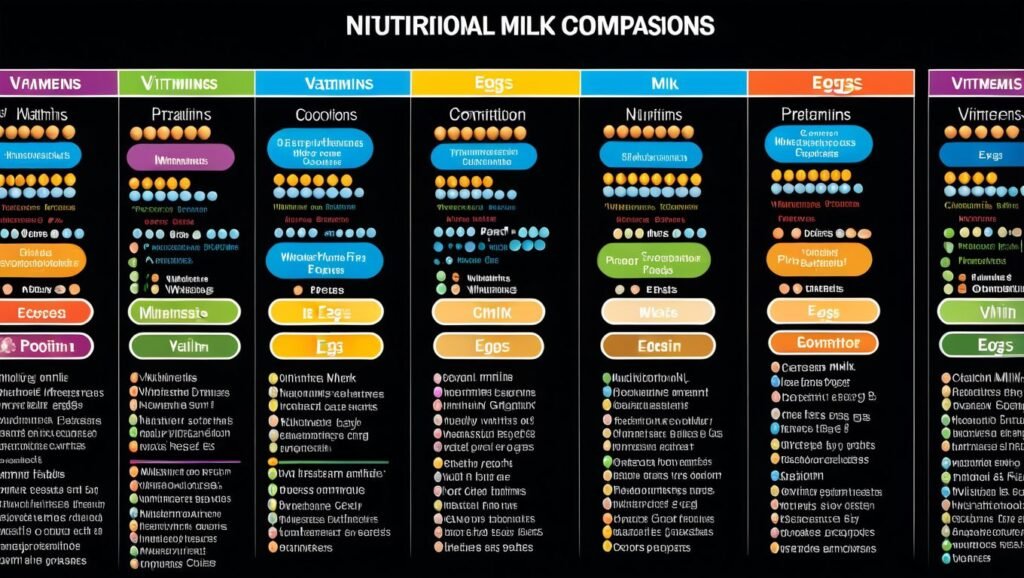
Immunoglobulins in Eggs
Eggs are rich in immunoglobulins, which are critical for immune function.
- What Are Immunoglobulins?
- Also known as antibodies, immunoglobulins are proteins that play a crucial role in identifying and neutralizing pathogens like bacteria and viruses.
- They are particularly concentrated in the egg white and are a part of the egg’s defense mechanism to protect the developing embryo.
- Benefits to Human Immunity:
- Immunoglobulins in eggs can help boost the body’s defense system by supporting immune cell activity.
- They may also have therapeutic applications in reducing gut inflammation and combating infections.
- Other immune-boosting nutrients in eggs:
- Vitamin A supports the production of white blood cells and strengthens mucous membranes in the respiratory and digestive tracts.
- Selenium enhances the production of cytokines, proteins critical for immune responses.
Conclusion
Milk and eggs are nutritional powerhouses with significant benefits for heart health, weight management, and immune system support. Milk provides essential antioxidants and calcium, while eggs contribute immunoglobulins and high-quality protein. Together, they form a complementary pair for maintaining overall health and resilience.
Benefit 7: Versatility in Diet
Milk and eggs are incredibly versatile ingredients, playing a foundational role in many cuisines. Their diverse applications make them staples for cooking, baking, and creating a wide range of dishes.
Cooking and Baking with Milk
Milk serves as both a primary ingredient and an enhancer, adding richness, moisture, and flavor to recipes.
- In Cooking:
- Soups and Sauces: Milk is used as a base for creamy soups, such as chowders, and sauces like béchamel or Alfredo.
- Savory Dishes: It’s added to mashed potatoes, casseroles, and pasta for creaminess and depth.
- Drinks: Milk is the star of beverages like hot chocolate, smoothies, and milkshakes.
- In Baking:
- Texture and moisture: Milk helps create soft and moist cakes, muffins, and breads.
- Yeast Activation: Warm milk can activate yeast in bread-making, aiding dough in rising.
- Flavor Balance: Milk neutralizes the acidity of ingredients like cocoa powder, enhancing overall flavor.
- Specialty Uses:
- Whipped Milk Froth: Ideal for lattes and cappuccinos.
- Custards and Puddings: Milk is essential for creamy desserts like crème brûlée and rice pudding.
Cooking and Baking with Eggs
Eggs are a cornerstone in both cooking and baking due to their unique binding, leavening, and thickening properties.
- In Cooking:
- Binding: Eggs hold ingredients together in meatloaves, burgers, and fritters.
- Thickening: They thicken sauces, custards, and soups, providing a smooth consistency.
- Flavor and Texture: Eggs are central to omelets, frittatas, quiches, and soufflés.
- In Baking:
- Structure and Rise: Eggs provide structure to cakes and cookies and help batters rise.
- Moisture: They add moisture to baked goods, ensuring softness and richness.
- Glazing: Brushing egg wash on pastries and bread gives a golden, glossy finish.
- Specialty Uses:
- Meringues and Foam: Beaten egg whites are used in desserts like pavlova and macarons.
- Emulsification: Eggs stabilize emulsions in mayonnaise and hollandaise sauce.

Benefit 8: Dietary Restrictions and Alternatives
While milk and eggs are widely consumed, dietary restrictions such as lactose intolerance, allergies, or veganism require suitable alternatives.
Lactose-Free Milk Options
Lactose intolerance affects the ability to digest lactose, the sugar found in milk. Fortunately, several alternatives cater to this dietary restriction:
- Lactose-Free Cow’s Milk:
- Enzymes like lactase are added to regular milk to break down lactose.
- Provides the same nutritional benefits as regular milk, including calcium, vitamin D, and protein.
- Plant-Based Milk Alternatives:
- Almond Milk: Low in calories, with a nutty flavor; often fortified with calcium and vitamin D.
- Soy Milk: High in protein and nutritionally comparable to cow’s milk.
- Oat Milk: creamy and rich, with added fiber for digestive health.
- Coconut Milk: Adds a tropical flavor, suitable for curries and desserts.
- Specialty Uses:
- Barista versions of plant-based milk foam well for lattes.
- Unsweetened varieties are ideal for savory dishes.
Egg Substitutes for Vegans
Vegans and those with egg allergies often seek substitutes that replicate eggs’ unique properties in cooking and baking. Here are some effective alternatives:
- For Baking:
- Flaxseed Meal: Mix 1 tablespoon of ground flaxseed with 3 tablespoons of water to replace one egg. Works well in cookies and muffins.
- Chia Seeds: Similar to flaxseed, chia seeds form a gel-like texture when mixed with water.
- Applesauce: Use 1/4 cup of unsweetened applesauce as an egg substitute in cakes and brownies.
- Silken Tofu: 1/4 cup of blended silken tofu can replace one egg, offering a neutral flavor and moisture.
- Banana: Mashed bananas (1/4 cup per egg) work well in sweet recipes like pancakes and muffins.
- For Cooking:
- Aquafaba: The liquid from canned chickpeas can be whipped into stiff peaks, making it a perfect substitute for egg whites in meringues and mousses.
- Commercial Egg Replacers: Powdered products like Bob’s Red Mill Egg Replacer are convenient and versatile for both baking and cooking.
- Specialty Uses:
- Black Salt (Kala Namak): Adds an egg-like flavor to vegan dishes such as tofu scrambles.
- Vegan Egg Mixes: Products like JUST Egg mimic scrambled eggs and can be used in similar recipes.
Conclusion
Milk and eggs are versatile staples, yet their alternatives cater to a range of dietary restrictions without compromising on functionality or flavor. Lactose-free milk options ensure those with intolerance can still enjoy the benefits of dairy, while plant-based substitutes provide vegan-friendly choices. Similarly, innovative egg substitutes replicate their binding, leavening, and flavoring roles, making it easy for anyone to enjoy diverse recipes regardless of dietary preferences.
Ready to Elevate Your Nutrition?
Milk and eggs are nutritional powerhouses that offer incredible benefits for health, versatility, and dietary flexibility. Whether you’re looking to boost your immune system, manage your weight, or enhance your cooking and baking, these staples—and their alternatives—are here to support your lifestyle.
Take the Next Step Today!
Incorporate milk, eggs, or their alternatives into your meals and experience their amazing benefits firsthand. Experiment with recipes, explore new substitutes, and make every meal a step toward better health and creativity in the kitchen.
Start your journey now! Share your favorite milk and egg recipes or tips for substitutes in the comments below. Let’s inspire each other to live healthier, happier lives!

